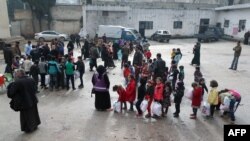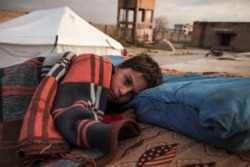The United Nations Children's Fund is appealing to the warring parties in Syria to protect hundreds of thousands of children at risk of death and displacement from the carnage in and around the northwest province of Idlib.
New Year's Day is traditionally a day of hope, a day when people look forward to a brighter year ahead. On this New Year's Day, UNICEF reports five children, aged between 6 and 13, were killed when their primary school in Idlib province was hit by rocket fire.
UNICEF spokeswoman Marixie Mercado acknowledges Syria's warring parties are not likely to respond to her agency's appeal for the fighting to stop but she says they should.
"Children in Syria, who have absolutely nothing to do with this conflict are bearing the brunt of this conflict,” she said. “A whole generation of children have known nothing now but war. How can that be a good thing for anybody?"
Some three million civilians who live in Idlib province have nowhere to go. They are trapped. All avenues of escape from the fighting are blocked.
The United Nations reports more than 235,000 people have been displaced within the region. This, since Syrian forces and their Russian allies launched a military offensive to retake Idlib from al-Qaida-affiliated jihadists and rebel allies in mid-December. Children account for more than half of those forced to flee their homes. Many have already been displaced multiple times.
Children's lives have been disrupted in many other ways as well. Over the past year, UNICEF reports 145 schools in Syria have been attacked, depriving tens of thousands of children of an education. The U.N. has verified 82 attacks on hospitals and medical staff, depriving children and adults alike of essential health care.
Mercado said more than 90% of these attacks were in the northwest, including in Idlib. She told VOA that young people in Syria are being robbed of their childhood and their dreams.
"Some of the testimony that I have heard from mothers is, is, is what—you know it really hits home when they talk about the change that they see in their children, the lack of hope that their children express. And, even the anger at being forced to live through such conditions. These are no conditions for children," she said.
Mercado said UNICEF is on the ground in Syria doing what it can to keep children alive amid the violence, chaos and biting winter cold. She said UNICEF and partner agencies are providing winter clothes and blankets, clean drinking water, health care, education and psychological support.
While these actions are saving lives, she says they are not enough. Only an end to war and peace, she said, will bring children the safety and prospect of a hopeful future they need and deserve.





